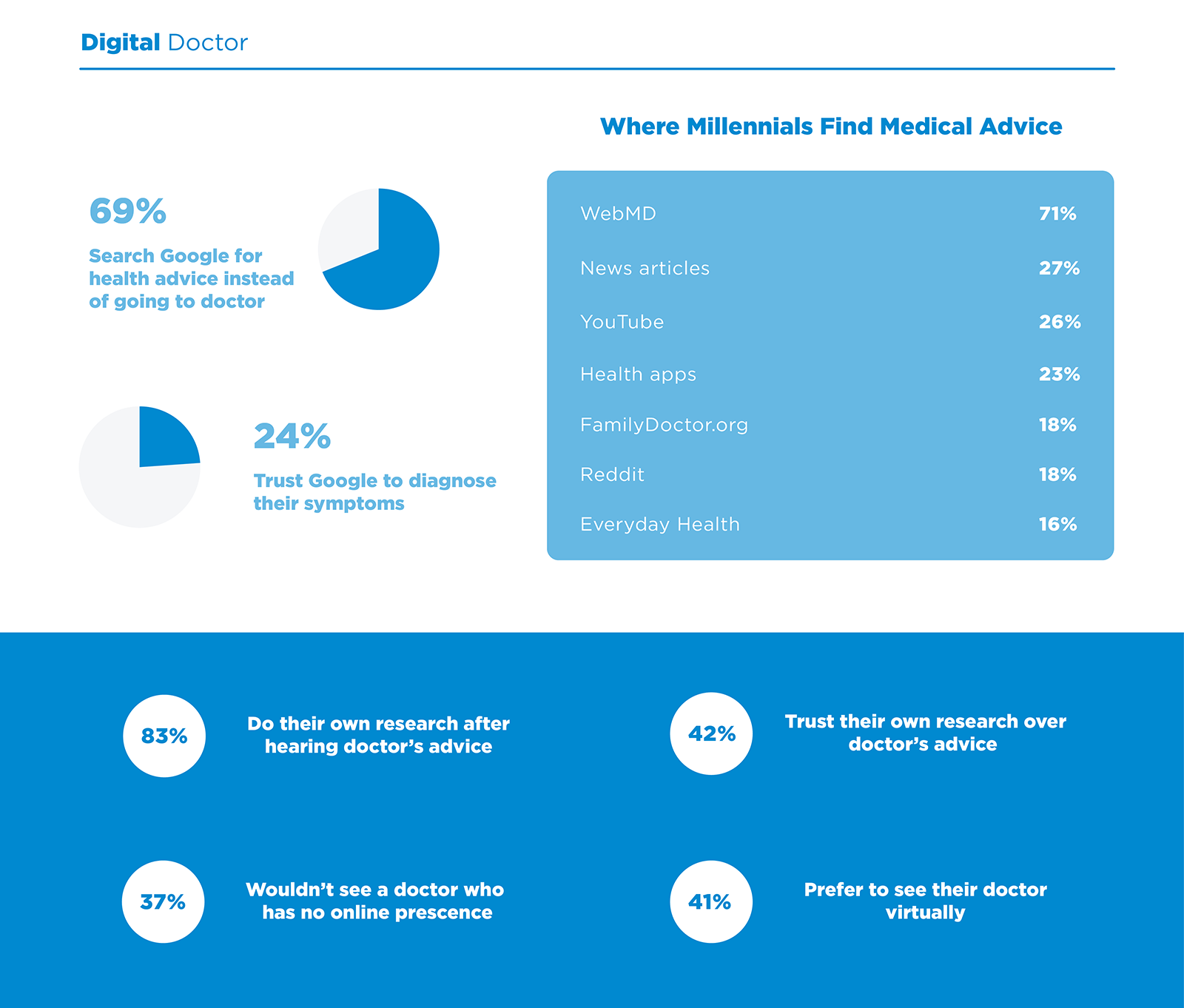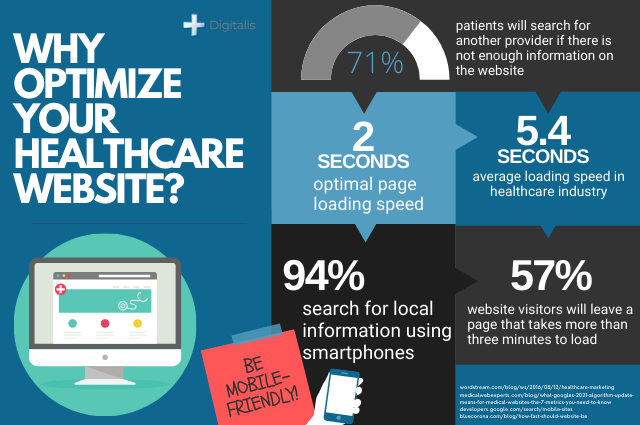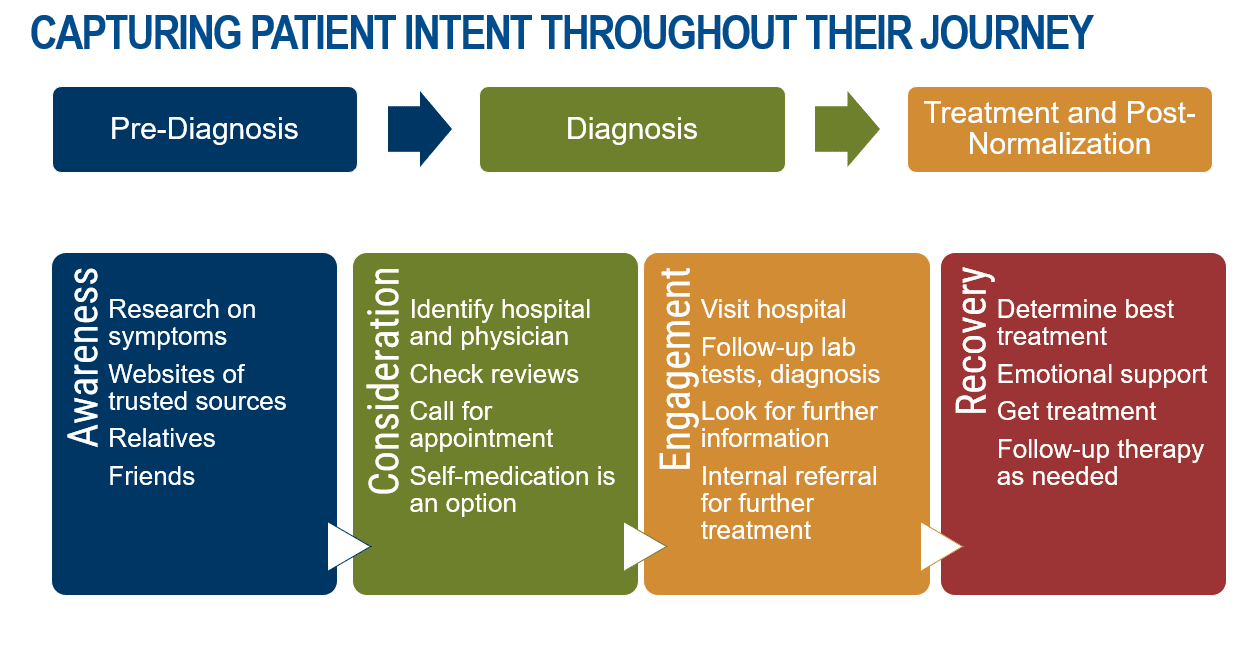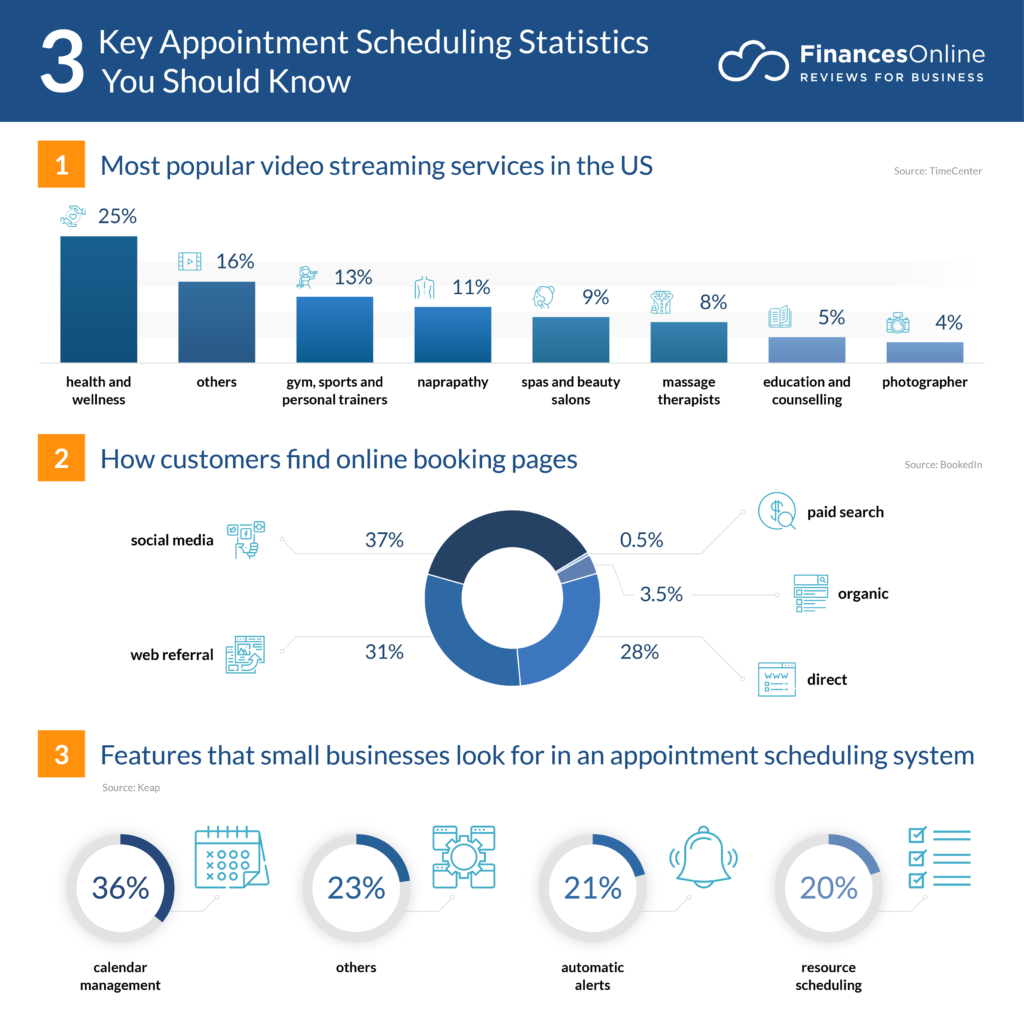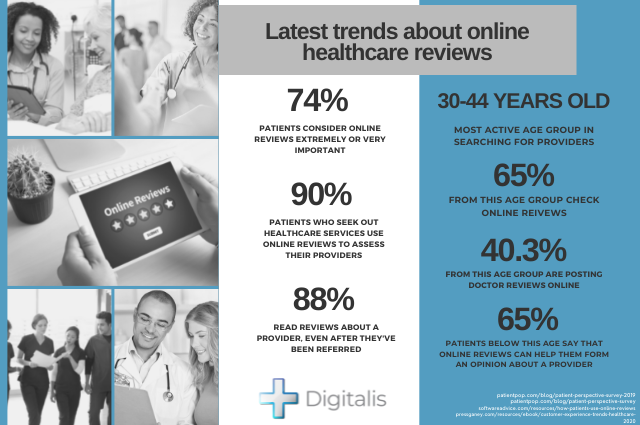Request for more details
With more and more patients turning to the internet to find doctors and other medical services, search engine optimization (SEO) has become an essential strategy for healthcare professionals. More than half (69%) of people turn to Google to find medical advice instead of contacting their primary care physician.
SEO for healthcare professionals helps improve your website's visibility on major search engines like Google so that your medical website appears higher in the search results for relevant keywords. The higher up your website ranks, the more likely patients are to find you and choose your services.
Understanding Organic SEO for Medical Websites
Organic SEO refers to the process of attracting unpaid search engine traffic through algorithm-based search results on search engines like Google, as opposed to paid ads. Organic search rankings are achieved by optimizing your website and content to match Google's evolving criteria for relevance and authority and move your site position up in search engine results pages.
This involves techniques like keyword research, site speed optimization, high-quality content creation, and link-building. The goal is to appear prominently in search results for industry keywords so you get found by potential patients researching medical issues or looking for local doctors.
What is Healthcare SEO?
Healthcare SEO is the practice of optimizing a healthcare website to rank higher in search engines for medical and health-related keywords. It allows you to reach patients searching for specific treatments, conditions, doctors, medications, facilities, and other healthcare services.
Healthcare SEO aims to make your website more visible and discoverable to prospective patients researching healthcare online.
Why is SEO important for healthcare professionals?
SEO for healthcare providers is important for several reasons:
- Drives qualified organic traffic to your website from organic search
- Builds credibility and trust in your practice
- Helps you compete with larger healthcare systems and clinics
- Allows you to reach new patients and grow your practice
- Cost-effective compared to paid search marketing
- Keeps your practice top of mind with patients
That is not all!
According to a Google study,
- Search drives about 3 times more visitors to hospital sites than non-search visitors
- Nearly half of the patients (44%) who research hospitals on their mobiles schedule an appointment.
- 53% of patients who did not see a hospital video never knew that those hospitals existed, showing the importance of video SEO.
- When patients are on the brink of conversion, they often search for symptoms and conditions.
- 84% of patients do hospital research online, as well as offline.
What makes Healthcare SEO different from traditional SEO?
Though the SEO fundamentals are the same, healthcare SEO has some unique considerations:
- Heavy focus on local SEO to attract patients in your geographic area
- Optimizing for specialized medical and healthcare keywords
- Staying updated on Google's guidelines for YMYL (Your Money or Your Life) websites
- Legal compliance regarding health claims and regulated substances
- Authoritativeness signals like practitioner licenses and credentials
- Reputation management on review sites like Healthgrades and Vitals
B2C Healthcare SEO vs. B2B Healthcare SEO
B2C healthcare SEO targets patients looking for doctors or treatments. B2B healthcare SEO reaches other businesses like hospitals, insurance providers, pharma companies, etc. Each has different target keywords. For example, B2C may focus on keywords like [city] cardiologist, while B2B would optimize for medical software keywords.
Medical Keyword Research for Healthcare Websites
Keyword research is a crucial first step in any SEO strategy, and healthcare SEO is no exception. Choosing the right keywords to target can help your medical website attract more of your ideal patients searching for healthcare services online.
Importance of Choosing the Right Medical Keywords in Healthcare SEO
The keywords you optimize for should reflect the specific services, treatments, and expertise offered by your healthcare practice. For example, a cardiologist would want to rank for keywords like “[city] cardiologist”, “heart surgery [city]”, and “congestive heart failure treatment [city name]”.
Targeting broad, high-competition keywords like “doctor” would attract irrelevant traffic. So it's important to do thorough medical keyword research and identify the precise healthcare terms your ideal prospective patients use when searching for healthcare providers like yourself.
Factors to Find the Right Healthcare Keywords for Your Medical Website
Here are some key factors to consider when researching keywords for healthcare SEO:
- KD - Keyword Difficulty indicates how hard it may be to rank for a particular keyword. You want to aim for keywords with a KD% under 30.
- CPC - Cost-Per-Click tells you the estimated ad cost for a keyword. This helps assess commercial intent and value.
- Intent - Analyze search intent to find informational vs. commercial keywords. Focus on both types of keywords to attract, engage, and convert prospective patients.
- Volume - Monthly search volume indicates potential traffic a keyword can drive. Look for a healthy amount of volume.
Keyword Research Tools for Medical Websites
For healthcare websites, thorough keyword research is crucial to identify the medical terms and healthcare phrases prospective patients are actually searching for to find medical services.
Here are several powerful keyword research tools that healthcare marketers can utilize to uncover their most relevant target keywords:
- Google Keyword Planner - This free tool from Google provides keyword volume data and suggestions based on a given seed keyword. It can give healthcare marketers valuable insight into monthly search volumes for medical and health-related keywords. The volume metrics are useful for gauging keyword difficulty and demand.
- SEMrush - A robust paid tool, SEMrush offers in-depth keyword data including volume, CPC, competition level, and keyword ideas. It is ideal for healthcare SEO thanks to features like the Phrase Match tool which generates semantically related long-tail variants of seed keywords. This helps discover more targeted healthcare keywords.
- Moz Keyword Explorer - Moz's keyword research tool analyzes metrics like volume and difficulty score to help healthcare marketers identify less competitive keywords aligned with their medical services. Useful features like comparable keywords and SERP analysis make it valuable for comprehensive keyword research.
- Ubersuggest - This free keyword tool by Neil Patel quickly generates keyword suggestions along with data like monthly health-related searches, CPC, and keyword difficulty percentage. The healthcare keyword ideas it provides can jumpstart keyword research. Its filters and sorting options also simplify the process.
- AnswerThePublic - A free tool that utilizes autocomplete data, AnswerThePublic is helpful for discovering long-tail keyword ideas based on the questions real people are asking on search engines. The healthcare-related questions it provides can uncover intent-based keywords.
Competitor Analysis to Identify Keyword Gaps
In addition to looking at your own target customers, analyzing your competitors' healthcare SEO strategy can help you find valuable healthcare keyword opportunities. By identifying the keywords your competing healthcare businesses rank for, you can find "gaps" - keywords they are ranking for that your own website isn't.
These competitor keyword gaps represent prime SEO opportunities to target keywords relevant to your medical services that competitors are already ranking well for.
Some ways to carry out effective competitor analysis for keyword research:
- Use a tool like SEMrush to analyze their organic keywords and search traffic sources. Look for their top-ranking keywords with high volume.
- Search for your most important target keywords and analyze their rankings on the SERP. Are they consistently outranking you for your primary keywords? Those present keyword gap opportunities.
- Study their content and identify keywords they are targeting heavily. Does their content better optimize for your target keywords compared to your own site? That indicates potential keyword gaps to improve upon.
- Compare your Google Search Console and Analytics data with theirs to analyze the difference in keyword rankings and traffic. Identify opportunities to optimize for their top keywords driving traffic.
- You can also sign up for keyword monitoring tools to get alerts whenever competitors begin ranking for new keywords. Stay on top of their keyword strategy.
Why Focus on Long-Tail Keywords in Healthcare SEO?
In healthcare SEO, long-tail keywords are search queries with three or more words such as "physical therapy for rotator cuff tear" or "dentist for kids [city name]".
As opposed to short (broad) keywords, long-tail keywords are:
- More specific niche healthcare services searchers use
- Less competitive with lower keyword difficulty
- Better at attracting highly targeted visitors
Optimizing for long-tail versions of healthcare keywords presents big opportunities:
- They convert better - Long-tail visitors have stronger intent so they're more likely to convert into patients.
- High ROI - The ROI on long-tail keywords is very high thanks to ultra-targeted traffic.
- Easier to rank - You can rank on Page 1 for long-tail over short keywords much faster.
- Less effort - Requires simpler optimization using keywords naturally vs. over-optimization.
- Compound value - Collectively, long-tail keywords drive significant traffic volume.
How to Create a Keyword Mapping Strategy for Medical Websites
Once healthcare SEO professionals complete thorough healthcare keyword research, the next step is mapping those keywords to relevant pages on your medical website through "keyword mapping". This involves optimizing individual pages around specific keyword themes.
For example:
- Map keywords like [city] orthopedic surgeon, orthopedic surgery [city], total knee replacement [city] to your Knee Surgery page
- Target keywords such as [city] dentist no insurance, dental services no insurance accepted, to your Affordable Dental Care page
- Optimize Specific-Service Page for keywords, such as [city] radiation oncologist, prostate cancer radiation [city], radiation for breast cancer [city]
Some tips for effective keyword mapping:
- Only map closely relevant keywords to each page. Don't force keyword optimization.
- Use keywords naturally in page content rather than awkward over-optimization.
- Include related long-tail keyword variations for each target keyword.
- Update page titles, metadata, headings, and image names for the keywords.
- Create localized and service-specific landing pages to map even more keywords.
Precise healthcare keyword research and selection ensure your medical SEO strategy targets the right keywords that patients are searching for. Analyze keyword difficulty, intent, volume, and competitors to identify the best terms to focus your SEO efforts on.
With the right keywords mapped to your important website pages, you can attract high-quality visitors searching for specific medical services you provide. Healthcare providers can further enhance these efforts by choosing specialized SEO packages that include in-depth keyword research, content optimization, and technical improvements tailored to the medical industry.
Medical Content Creation and Optimization
Creating high-quality, optimized content should be a core part of any healthcare website's SEO strategy. Your medical content, from blog posts to service pages, serves as the backbone of your healthcare SEO efforts. Follow these healthcare content creation and optimization best practices.
E-A-T and YMYL-Based Healthcare Content
E-A-T and YMYL are two important concepts for medical websites to understand when it comes to optimizing content for search engines like Google.
What Is E-A-T?
E-A-T stands for Expertise, Authoritativeness, and Trustworthiness. It refers to the standards Google uses to assess the overall quality and reliability of a website's content. Websites need to demonstrate high E-A-T, especially YMYL sites.
Expertise:
- Clearly display the credentials of doctors or medical experts authoring content on your site. List their medical specialty, education, and years of experience
- Cite reputable sources like medical research papers and clinical studies to exhibit the depth of knowledge.
- Use precise medical terminology suited to your specialization to convey expertise. Avoid unsubstantiated claims.
Authoritativeness:
- Optimizing content for keywords directly related to your healthcare services shows authority on those topics.
- Link internally to trusted sources on your site like doctor bio pages or service descriptions.
- Earn high-quality backlinks from authority domains like WebMD, and MayoClinic to boost authoritativeness.
Trustworthiness:
- Write transparent, honest content that puts visitors' health first over promoting your services.
- Ensure content comprehensively answers patients' questions and addresses their concerns.
- Make it easy to verify credentials and contact the healthcare provider.
- Publish content only on medical topics closely related to your specialization.
What does YMYL mean?
YMYL stands for "Your Money or Your Life". Google classifies pages and websites that provide medical, financial, or legal information and services as YMYL. It includes medical websites. Google evaluates websites based on Expertise, Authoritativeness, and Trustworthiness (E-A-T). Healthcare content needs to demonstrate high E-A-T to rank well and comply with Google's strict policies for YMYL (Your Money or Your Life) websites. "Your Money or Your Life" signifies content topics that can directly impact users' lives either financially or in terms of health and wellness, hence the need for greater care, reliability and accountability.
Healthcare websites fall under the YMYL category which has strict content policies:
- Provide clear evidence for any health claims about treatments, products, or services. Avoid unsubstantiated assertions.
- All medical advice or recommendations must come from a licensed, credible healthcare professional.
- Disclose risks, side effects, or negatives associated with any medical procedures or products discussed.
- Any mentions of pricing, cost, or insurance must be transparent and upfront about full costs. No hidden fees.
- Comply with Google's ads policies regarding regulated goods like pharmaceuticals. Disclose paid promotions clearly.
Failing to meet YMYL policies can lead to harmful medical misinformation spreading through search engines. Healthcare content must adhere to YMYL standards.
Some Tips to Create YMYL Content
- Display credentials of doctors/experts authoring content prominently
- Link to reputable sources like medical journals to exhibit expertise
- Address visitor intents and concerns to build trust
- Use strategic medical content and vocab to convey authority
- Publish content only on relevant topics directly related to your healthcare services
- Create authoritative, trustworthy content on healthcare subjects you specialize in
Importance of Medical Blogging
Regular blogging is tremendously beneficial for healthcare sites because it:
- Drives new visitors through fresh, indexable content
- Establishes thought leadership and subject authority
- Caters to different informational needs and medical long-tail keywords
- Keeps medical website content up-to-date for return visitors
- Allows engagement with patients through comments
Blogging helps healthcare providers attract and retain more patients by delivering value.
Structuring Medical Articles
- Use strategic headers (H2, H3 tags) with target keywords but don't over-optimize.
- Include useful images and videos related to the medical content.
- Break content down into skimmable sections and bullet points.
- Insert relevant internal links to other medical pages on your site.
- Link out to authoritative medical sources to enrich content.
- Feature-focused call-to-action buttons to convert readers.
Optimizing Content for Patient Intent
Identify what motivates users to search for a healthcare-related keyword and create content accordingly.
- Informational - Educational content addressing concerns, questions and interests
- Commercial - Conversion-focused content spotlighting your medical services
- Navigational - Detailed content for keywords referencing your brand, services
Avoiding Duplicate Content
Duplicate content dilutes your healthcare website's authority. Thus, it is crucial to eliminate duplicate content on your healthcare website as soon as possible.
Tips to Avoid Duplicate Content in Your Medical Website
- Produce 100% original content and checking for plagiarism
- Only republish content in full with proper attribution
- Use canonical tags on similar pages to indicate the original
- Add distinct supplemental content to existing topics
- Update outdated evergreen content over time
Duplicate content penalties can significantly hurt medical SEO rankings, so eliminate duplication.
Optimized, high-quality medical content builds trust and authority with prospective patients while also fueling ongoing SEO success. Ensure your healthcare website's content strategy aligns with your specialization, provides value to website visitors, and employs optimization best practices. This ultimately enables you to leverage your content for improved patient acquisition and retention.

Free SEO Analysis
On-Page SEO Optimization of Your Medical Website
On-page SEO refers to optimizations made directly on the website to improve rankings. Perfecting your medical website's on-page factors is crucial for healthcare SEO success.
Title Tags and Meta Descriptions
Title tags and meta descriptions are critical on-page elements that summarize page content in search results. Title tags should be concise, include primary keywords, and convince searchers to click. Meta descriptions can more broadly describe the page content to entice clicks. Optimized titles and meta descriptions improve click-through rates.
Title tags and meta descriptions preview your pages on search engines. Optimize them with target keywords and compelling messaging.
For example:
Page: Services
Title tag: Our Medical Services | Expert Care | Seattle Health Clinic
Meta description: We offer a wide range of specialist and primary medical services to meet your healthcare needs. Learn more about the trusted care we provide.
In this example, the title tag incorporates keywords like "medical services" while the description entices searchers to click and learn more.
Header Tags and Content Structure
Header tags like H1, H2, and H3 tags organize content structure through keyword-rich headings that break up blocks of text. This improves readability while also signaling to search engines the focus of each content section on the page. Strategic use of headers enhances on-page SEO.
In other words, proper header tags create an outline for search engines and improve on-site readability.
Example for content structure:
H1: Knee Replacement Surgery in Seattle
H2: Our Expert Knee Surgeons
H2: When it's Time for Knee Replacement
H2: Preparing for Knee Replacement Surgery
H2: Cost and Financing Options for Knee Replacement
In addition, break up content into paragraphs and bullet points for better readability. Use keyword headers to mark important sections.
Image Optimization for Healthcare Websites
Did you know images can attract more clicks if optimized properly? Images should have descriptive file names and ALT text containing target keywords to help them rank in Google Images. The ALT text also improves accessibility and SEO if images don't load properly.
For example:
File name: knee-replacement-surgery-seattle.jpg
Alt text: Knee replacement surgery incision with sutures in Seattle WA area.
This helps images rank in Google Images while also improving accessibility.
URL Structure Best Practices
URLs should be concise, keyword-rich, and easy to understand. Avoid overlong URL parameters and numbers that lack meaning. Descriptive, organized URL structures like example.com/services/cardiology improve user experience and on-site SEO.
Short, descriptive, and keyword-rich URLs allow search engine users to instantly know what the page is about.
Bad: www.healthclinic.com/pageId=384920
Good: www.healthclinic.com/orthopedic-surgery/knee-replacement/
Internal Linking of Important Pages
Cross-linking related pages on your site using anchor text with focus keywords helps establish site structure and interconnectivity between topically relevant pages. This strengthens internal linking for better rankings.
For example:
"Learn more about "knee replacement surgery" and how it can relieve osteoarthritis knee pain."
This strengthens the interconnectivity of topically related pages.
User Experience (UX) of Medical Website
Optimizing website speed, navigation, page layouts, forms, and content presentation enhances user experience. Good UX keeps visitors engaged to explore more pages and convert rather than quickly bounce. Technical optimizations like caching plus strong information architecture improve medical site UX.
Your medical website must offer an excellent user experience so that users don’t feel the need to turn to your competitors.
- Mobile responsive design for all device access
- Easy-to-navigate menus and site architecture
- Clear, consistent page layouts and CTAs
- Fast load speeds - optimize images, enable caching, minify code
- Readable content, proper headings, and page structure
- Simple forms, minimal required fields
Following best practices for your medical website's content, URL structure, internal linking, and overall UX is vital for optimizing the on-page SEO that search engines evaluate when ranking healthcare sites.
Technical SEO Optimization of Your Medical Website
Technical SEO factors critically impact rankings and user experience of medical websites. Optimize these aspects for better performance and visibility in organic search results.
SSL Certification for Website Security
Having HTTPS SSL certification on your medical website is vital for security and SEO. SSL encrypts data transmission and establishes trust.
In Chrome, HTTPS pages show a secure lock icon. Not having SSL will cause browser warnings that drive visitors away and hurt SEO. Hence, healthcare sites must prioritize SSL.
Page Load Speed and Core Web Vitals
Site speed affects visitor engagement and SEO. For optimized page speed, Google recommends optimizing for Core Web Vitals metrics:
- LCP (Largest Contentful Paint) measures loading experience. Keep pages under 2.5 seconds.
- FID (First Input Delay) tracks responsiveness. You must aim to keep FID under 100 milliseconds.
- CLS (Cumulative Layout Shift) reduces layout jumpiness. Your target for CLS should be under 0.1.
To increase page speed, you can:
- Compress images
- Enable browser caching
- Lazy load of non-critical resources
- Streamline code for better speed
Mobile-Friendly Design
With Google's mobile-first indexing, having a mobile-friendly site is mandatory. Use a responsive design and minimal tap targets. Don't show intrusive interstitials. Check mobile-friendliness using Google Search Console's tool.
Website Structure and Navigation
Make navigation intuitive with menus that clearly organize important pages. Keep site architecture simple and links working. Underlined links indicate active pages. This enhances user experience and site navigation.
For example, a cardiology center can have "Services > Treatments > Angioplasty" to guide users logically.
XML Sitemaps and Robots.txt
Sitemaps outline website pages for search engine crawling. The robots.txt file manages crawl access. Submit sitemaps in the Google Search Console for better indexing and restrict private pages with robots.txt. Also, check that important pages are not restricted for access in the robots.txt file.
Fixing Duplicate Content Issues
Duplicate content dilutes page authority. Address using canonical tags to indicate the original page or 301 redirects to consolidate content. Removing duplicate content prevents search indexing issues.
Site Architecture Optimization for UX
Design site architecture focused on user experience. Group related medical services together logically. Make key healthcare content easy to find. Remove old abandoned pages. This enhances on-site SEO.
For example, an orthodontist can have treatments organized by adults, teens, and kids for better UX. Technical SEO best practices optimize how search engines crawl, index and rank your healthcare website for an improved competitive presence.
Off-Page Optimization Strategies for Healthcare SEO
While on-page SEO establishes your healthcare website's foundation, off-page optimization is crucial for brand reach and awareness, as well as search engine rankings.
Earn Quality Backlinks from High DA Healthcare Websites
Obtaining backlinks from reputed websites enhances your domain's trust and authority. Reach out strategically to earn backlinks. Clinics or medical practitioners could get backlinks from contextually relevant sites in different ways. Sponsor health articles on popular high DA websites such as WebMD and MayoClinic by contributing insightful expertise on a health topic relevant to their specialty. This earns an author bio link. Get featured as an expert source in mainstream media articles on trending health news published on sites such as MedicalNewsToday, Healthline, and EverydayHealth. Volunteer as a subject matter expert for a quoted opinion in an industry report published on a prestigious health site. Be interviewed as a guest on leading healthcare podcasts like Healthcare Triage and The Medical Futurist which leads to site links. The key is to identify widely-liked, high-domain authority sites frequented by your target patients and secure contextual backlink opportunities through compelling thought leadership.
Social Media Optimization
About 90% of Americans use social media to look for health-related information.
Having an active optimized presence on social media like Facebook, LinkedIn, and Twitter is valuable for healthcare SEO. Highlight your medical expertise, engage community connections, and link to your content. For instance, a dermatology practice can share skincare tips on Facebook and LinkedIn business pages targeting professionals needing skin treatments, and tweet articles linking back to its site. This expands the brand reach and referral traffic.
Make sure you provide an option to schedule medical appointments through your social media page, in addition to your website.
Online Reputation Management for Medical Professionals
Proactively managing your online reputation through patient review platforms like HealthGrades, RateMDs, and Vitals is essential. Respond genuinely to patient feedback to address concerns transparently, highlighting your commitment to care. This builds community trust and loyalty. For example, a psychiatrist can request satisfied patients write positive Google reviews describing their responsive, compassionate treatment experience. This conveys credibility.
Guest Posting in the Healthcare Niche
Reaching out to reputed healthcare blogs and industry publications to contribute high-quality guest posts is an impactful link-building tactic. Ensure the content offers unique value before pitching relevant sites. For instance, a holistic health center could write an expert post on emerging naturopathic treatments for a leading natural medicine blog. The author’s bio links back to their site.
Implementing these powerful off-page SEO strategies through value-adding outreach, social media, and online reputation management greatly complements on-site healthcare SEO efforts to boost search visibility over time.
Local SEO for Medical Practices
For healthcare professionals, local SEO services is crucial to attract patients in your geographic area looking for specific medical services. Let's explore some of the most effective local SEO tactics for physicians, clinics, and healthcare providers.
Optimize Google Business Profile for Medical Pros
Having an optimized, completed Google Business Profile is the foundation of local SEO for your healthcare business.
- Fill out all relevant sections like services, FAQs, and treatment procedures.
- Add high-quality photos of your office, staff, and equipment.
- Include Schema markup for healthcare like General Physician, Dentist, etc.
- Insert a direct booking link so patients can easily schedule appointments.
- Enable messaging so users can contact your practice directly via GBP.
- Verify your GBP listing for enhanced visibility in local packs and maps.
94% of patients choose to switch to a new medical clinic if it offers an online appointment scheduling service.
Local Citations and NAP Consistency
CITATIONS
Getting listed on key local directories helps amplify your healthcare practice's visibility across relevant sites frequented by prospective patients.
Some top healthcare citations include:
- Yelp, YellowPages, and Mapquest
- Locally-popular listing sites covering your metro area
- Healthgrades, Vitals, and WebMD Provider Directory
- Industry associations and medical society directories
NAP CONSISTENCY
NAP refers to your Name, Address, and Phone number. Keep this identical across all citations, directories, social profiles, and GBP listings to strengthen localization signals.
A medical practice should use a structured citations campaign to build about +50 local listings with NAP consistency. It can help expand their local reach and discovery.
Online Ratings and Review Management
Actively monitoring and building your online ratings and reviews is essential for reputation and trust-building.
- Respond promptly to Google reviews, Yelp feedback, and Healthgrades ratings. Thank positive reviewers.
- Guide happy patients to write reviews on Google, Facebook, Vitals, etc. This gradually improves the overall rating.
- For negative reviews, address issues transparently and rectify them to showcase commitment to care.
- Embed positive review widgets on your website to highlight patient satisfaction.
Geo-Targeted Content Creation
Create locally-optimized content that ranks for geographic keywords patients search when looking for local medical care.
- Blog posts like "Top Pediatricians in [City]" or "Emergency Care Clinics in [City]".
- Location pages listing your services in specific neighborhoods such as [City] Physical Therapy Clinics
- FAQ content around medical treatments in nearby areas. For instance, "Best Sports Medicine Doctors near Los Angeles".
Build Listings in Local Directories
Beyond citations, create full directory listings on niche local sites where prospective patients look for healthcare providers. Optimize these listings with photos, services, bios, etc. to improve discoverability. For example, pediatricians can list their practice on local parenting sites, obstetricians on resources for expecting mothers, and dentists on local guides for families.
An optometrist can build a profile showcasing eye care services on 20+ directories frequented by seniors in their area to drive steady referral traffic. Implementing a robust local SEO strategy tailored to your healthcare specialty and geographic service region enables practices to stand out in location-based search and connect with nearby patients needing care.
Latest SEO Tools We Use














SEO for E-commerce Healthcare Websites
For e-commerce businesses selling healthcare products online, SEO is essential for driving traffic and sales. By optimizing your e-commerce website for search engines, you can attract more customers looking for medical supplies, fitness equipment, supplements, and more.
E-commerce Medical SEO Best Practices
- Optimize site architecture - Group products logically and make navigation intuitive. Allow easy filtering and faceted search.
- Improve site speed - Minify code, compress images, and cache pages. Faster sites have higher conversions.
- Mobile responsive design - Over 50% of searches are mobile. Ensure seamless experience across devices.
- Compelling product descriptions - Don't just list specs. Focus on problems solved and benefits. Include visuals.
- Strong call-to-actions - Clear CTAs like "See Pricing" or "Buy Now" drive conversions.
- Seamless checkout - Keep the checkout process minimal with the auto-fill feature, offer guest checkout, and make shipping and returns transparent.
These elements enhance medical e-commerce SEO and conversion rates.
E-commerce Keyword Strategy for Healthcare
Identify high-volume, low-competition keywords that get searched when consumers look for products you sell.
For example, an online retailer offering blood pressure monitors may target keywords like:
- Blood pressure cuff
- Automatic blood pressure monitor
- Wrist blood pressure monitor
- Omron blood pressure monitor
Medical Product Page Optimization
Optimizing product pages is crucial for e-commerce SEO. Ensure product titles contain the target keyword, like “Automatic Blood Pressure Monitor”. Use descriptive product detail copy that answers questions and influences purchase intent.
Include helpful images, videos, size charts, and other resources on the page. Make it easy for medical product buyers to navigate and add products to the cart. Optimize page speed and mobile layouts as well, since slow sites hurt conversion rates.
To optimize medical product pages, focus on the following elements:
- Descriptive title tags with main keywords
- Well-written meta descriptions that grab attention
- H1 and H2 tags with keywords to structure content
- Specs, features, and benefits highlighted
- Videos to showcase product usage
- FAQs answering common customer questions
- Customer images showing real-world product use
Medical Product Schema Markup
Markup your product pages with schema, which is code that helps search engines understand page content. Product schema provides key details like price, availability, ratings, and more. This improves the presentation of products in search results.
Use schema properties like:
- Product name
- Description
- Brand
- SKU
- Price
- Rating
- Image
Customer Reviews and Ratings
43% of people are more likely to go out of their insurance network for a healthcare professional with positive reviews.
Enable reviews on product pages. Respond promptly to address concerns and improve continually based on feedback. Make sure to show average ratings prominently because authentic reviews build trust.
With in-depth medical product content, robust technical SEO, and an optimized e-commerce user experience, healthcare companies can drive more organic revenue from online searches.
Measure and Track Healthcare SEO Success
Search engine optimization (SEO) is crucial for healthcare professionals and medical practices looking to attract more patients online. Implementing an effective healthcare SEO strategy takes time and effort. You need to regularly measure and track key metrics to understand what's working and what's not. This allows you to refine your approach over time and achieve the best results.
Set Up Google Analytics and Google Search Console
The first step is setting up Google Analytics and Google Search Console for your website.
Google Analytics gives you data on website traffic, top pages, referral sources, and more. Google Search Console offers insight into how your site performs on Google search.
Connect these free tools to start gathering key data. Make sure to set up conversion tracking as well. This allows you to see how many website visitors complete desired actions like calling your office or booking appointments online.
Key Healthcare SEO Metrics to Monitor
Once Google Analytics and Search Console are set up, pay attention to important healthcare SEO metrics including:
- Organic traffic - How many visits come from unpaid search results? Is this traffic growing month over month?
- Click-through rate (CTR) - What percentages of searchers click your listings? Higher CTR indicates relevant content.
- Keyword rankings - Which keywords drive the most traffic? How are you ranked for target terms?
- Site speed and mobile optimization - Fast load times and mobile responsiveness boost SEO.
- Local rankings - For physicians, monitor Maps and local pack rankings for relevant keywords.
Conversion Tracking for Healthcare Professionals
To fully measure SEO ROI, use conversion tracking. With Google Analytics, you can add goals to track actions like:
- Online appointment requests
- Phone call leads
- Contact form submissions
- Email newsletter sign-ups
Improve Medical SEO Strategy Based on New Data and Findings
Consistently analyzing your SEO data allows you to refine your approach over time. If you notice a drop in organic traffic, dig into Google Search Console to identify issues. Add fresh content focused on high-value keyword targets. Expand your backlink profile to regain lost rankings.
Use new conversion data to inform your healthcare content strategy as well. Optimize existing pages that already drive conversions. Create new content optimized for your most profitable keywords and topics.
By continuously reviewing data from Google Analytics and Search Console, you can measure the impact of your healthcare SEO efforts. Track progress month over month and year over year. Over time, you’ll unlock the best SEO strategy to drive more patients to your website.
Common SEO Mistakes in Healthcare
A strong search engine optimization (SEO) strategy is crucial for healthcare professionals to attract patients online. However, many make common SEO mistakes that hurt their keyword rankings and traffic. Avoid these errors to better optimize your medical website for SEO success.
Duplicate and Thin Content
Creating duplicate or thin content is an SEO mistake. Duplicate content refers to publishing the same or very similar content on multiple pages of your site. Search engines like unique, original content and may penalize duplicate pages. Thin content means you don’t have enough text and substance on a web page. An example of thin content would be a "Services" page with just a list of treatments and no detailed descriptions.
Google and other search engines want to see in-depth, useful content that answers patient questions. So, avoid duplicate and thin pages.
Not Optimizing Medical Websites for Mobile Devices
Today, the majority of web traffic comes from mobile devices like smartphones. Failing to optimize for mobile visitors is a huge missed opportunity in healthcare SEO. Make sure your medical practice website is mobile-friendly with a responsive website design. Mobile speed also matters as slow loading speed leads to high bounce rates.
Ignoring Local SEO for Medical Services
Local SEO is critical for physicians, dentists, clinics, and other healthcare businesses in the medical industry relying on local patients. This means targeting relevant city- and service-based keywords, like “Austin orthodontists”. It also involves getting your Google My Business listing complete and garnering local reviews and citations. Don’t ignore local SEO and miss out on traffic from nearby searchers.
Poorly Managed Online Reviews
Patient reviews significantly impact SEO and conversions. But if you don’t manage your online reputation, negative reviews can sink your rankings. Proactively encourage satisfied patients to leave positive reviews on Google, Facebook, and other sites. Respond professionally to any negative feedback. Maintaining a strong online reputation bolsters local SEO.
Not Staying Updated with Latest Algorithm Changes
Google regularly updates its search engine algorithms, sometimes multiple times per year. Failure to adapt to the latest algorithm changes can cause your rankings to go down. Stay up to date on SEO best practices as algorithms evolve. For instance, site speed became more important after Google’s “mobile-first indexing” update. Keep your SEO strategy aligned with Google’s priorities.
By avoiding these common healthcare SEO mistakes, you can achieve higher rankings and attract more patients from Google searches. Optimize content for mobile users, focus on local SEO, manage reviews properly, and stay updated on algorithms. With smart healthcare SEO strategies, you will convert more website visitors into real-world patients.
Future Trends in Healthcare SEO
Search engine optimization (SEO) is essential for healthcare professionals to attract patients online. The healthcare SEO landscape is constantly evolving as new trends emerge. Stay ahead of the curve by optimizing for these future trends in medical SEO.
Voice Search Optimization for Healthcare
Voice search usage is rising steadily, powered by smart devices like Amazon Alexa. Now, people use voice search even when using Google, YouTube, and other sites for typing in the search bar. Patients are increasingly using voice to ask medical questions and find nearby doctors.
Optimize your SEO strategy for voice search by:
- Creating content focused on question-style keywords that patients may ask aloud like “What are the symptoms of flu?”
- Using natural language and conversational wording in content to match how people speak
- Including your brand name frequently to rank for branded voice queries
- Optimizing for featured snippets to appear in voice search results
- Ensuring Google understands your pages by improving crawling and indexing
- Mastering voice SEO now will help you capitalize as voice search grows.
Video SEO for Healthcare
Video content is hugely popular today. YouTube users watch videos for over a billion hours daily. With video SEO best practices, healthcare providers can drive more traffic from YouTube and Google Video searches.
For healthcare video SEO, you can:
- Create a YouTube channel and regularly post new videos
- Embed videos on your site and optimize titles and descriptions
- Promote videos on social media to gain views and engagement
- Produce videos on trending healthcare topics as well as evergreen issues
- Transcribe videos and optimize transcripts for keywords
- Use keywords naturally in the video narration
AI and Machine Learning in Healthcare SEO
Artificial intelligence and machine learning are advancing rapidly. SEO tools that leverage AI can analyze website content, identify optimization opportunities, and predict traffic and conversions. AI may also power chatbots on healthcare sites for 24/7 patient support.
Other innovations like natural language processing will improve understanding of search intent and content relevance. Overall, AI and ML will enable more personalized medical SEO strategies and better search experiences. Healthcare providers should keep an eye on developments in these areas.
By staying on top of the latest healthcare SEO trends, you can target emerging search behaviors. Voice search, video SEO, and AI are key areas to focus on. Adapt your optimization strategies now to get ahead of the curve. With innovative SEO, you’ll continue attracting more patients from search in the years ahead. If you need professional assistance with healthcare or medical SEO or are looking for healthcare SEO services, please get in touch with our healthcare SEO experts at +1 6573124124 or info@mediasearchgroup.com.


